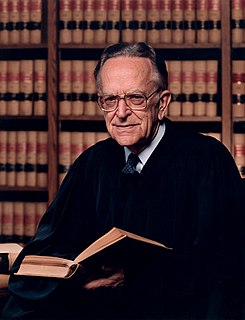A Quote by Melville Fuller
The Emancipation Proclamation is predicated upon the idea that the President may so annul the constitutions and laws of sovereign states, overthrow their domestic relations, deprive loyal men of their property, and disloyal as well, without trial or condemnation.
Related Quotes
Dream big dreams! Others may deprive you of your material wealth and cheat you in a thousand ways, but no man can deprive you of the control and use of your imagination. Men may deal with you unfairly, as men often do; they may deprive you of your liberty; but they cannot take from you the privilege of using your imagination. In your imagination you always win!
The so-called liberals of today have the very popular idea that freedom of speech, of thought, of the press, freedom of religion, freedom from imprisonment without trial-that all these freedoms can be preserved in the absence of what is called economic freedom. They do not realize that, in a system where there is no market, where the government directs everything, all those other freedoms are illusory, even if they are made into laws and written up in constitutions.
Lincoln has accepted America as a biracial society. He's talking about giving at least some black men the right to vote. In the Emancipation Proclamation he advises some blacks to labor faithfully for reasonable wages, here in the United States. He doesn't say anything about them leaving the country. He puts black men in the army. That is a whole different vision than simply saying "let's have them go out of the country." I think what's interesting is the change in Lincoln's view, but one must realize that he did adhere to this idea of colonization for many years.
For the mass of men the idea of artistic creation can only be expressed by an idea unpopular in present discussions - the idea of property... Property is merely the art of the democracy... One would think, to hear people talk, that the Rothschilds and the Rockefellers were on the side of property. But obviously they are the enemies of property; because they are enemies of their own limitations.
In reading over the Constitutions of all fifty of our states, I discovered something which some of you may not know: there is in all fifty, without exception, an appeal or a prayer to the Almighty God of the universe. Through all fifty state Constitutions, without exception, there runs this same appeal and reference to God who is the Creator of our liberties and the preserver of our freedoms.
I know some say, let us have good laws, and no matter for the men that execute them: but let them consider, that though good laws do well, good men do better: for good laws may want good men, and be abolished or evaded [invaded in Franklin's print] by ill men; but good men will never want good laws, nor suffer ill ones.
If you are going to abolish slavery, that opens up all these other questions: what system of labor is going to replace slave labor? What system of race relations is going to replace the race relations of slavery? Who is going to have power in the post-war South? The Emancipation Proclamation doesn't answer that question, but it throws [it] open.
Does man's freedom consist in revolting against all laws? We say no, in so far as laws are natural, economic, and social laws, not authoritatively imposed but inherent in things, in relations, in situations, the natural development of which is expressed by those laws. We say YES if they are political and juridical laws, imposed upon men by men.
The goodness or badness, justice or injustice, of laws varies of necessity with the constitution of states. This, however, is clear, that the laws must be adapted to the constitutions. But if so, true forms of government will of necessity have just laws, and perverted forms of government will have unjust laws.
The constitutions of most of our States assert, that all power is inherent in the people; that they may exercise it by themselves, in all cases to which they think themselves competent, or they may act by representatives, freely and equally chosen; that it is their right and duty to be at all times armed; that they are entitled to freedom of person, freedom of religion, freedom of property, and freedom of the press.

































